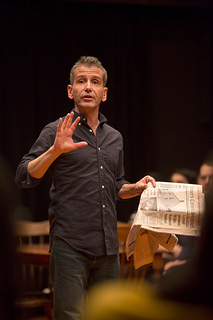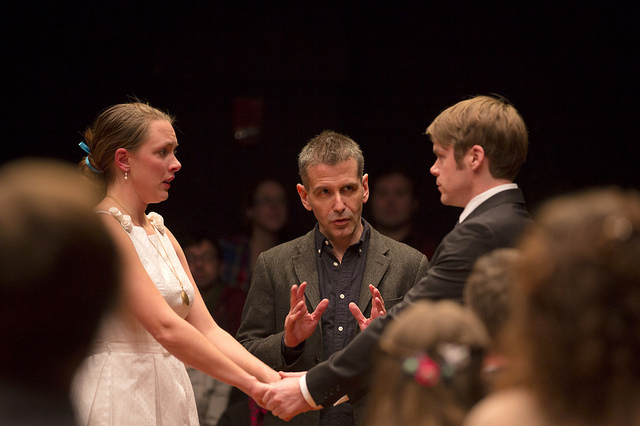Fuse Theater Review: An Intimate View of “Our Town”
Bare bones, determinedly unhokey, and intimate, director David Cromer’s matter-of-fact approach does away with the irritatingly self-conscious fussiness that afflicts so many productions.
Our Town by Thornton Wilder. Directed by David Cromer. Presented by the Huntington Theatre Company. At the Boston, MA, through January 26.
By Bill Marx.

David Cromer as the Stage Manager in the Huntington Theatre Company production of OUR TOWN. Photo: T. Charles Erickson.
First, let me be clear that among the many productions of Our Town that I have seen over the years, including a recent staging by New Hampshire’s Peterborough Players, a stage company located in the area that inspired Thornton Wilder’s Crover’s Corners, director David Cromer’s version (much lauded in New York) is among the best. Bare bones, determinedly unhokey, and intimate, the matter-of-fact approach does away with the irritatingly self-conscious fussiness, the cracker barrel pretentiousness that afflicts so many productions.
The performances in the Huntington Theatre Company staging are pointed and charming. Cromer makes for a no-nonsense, slightly urbanized Stage Manager; there are agile turns from Melinda Lopez as Mrs. Gibbs, Stacy Fischer as Mrs. Webb, and Christopher Tarjan as Mr. Webb. And yes, there is an inventive stroke of theatrical legerdemain in the last act that isn’t a gimmick but a moving response to the text. Here’s the bottom line: the production hits the refresh button on Our Town’s Americana.
But, still, it is Crover’s Corners, with those “old, old crisscrossing stars” zipping over the heads of the same line-up of stiff white people waxing folksy under the eye of eternity.
On the one hand, I have always agreed with critic Dwight Macdonald, who argues that Wilder’s script is the poster child for middlebrow art, typifying the kind of kitschy compromise where avant-garde techniques are put in the service of the banal. Yes, Our Town draws on modernist abstraction, with nods to Gertrude Stein, but the play does not set out to challenge or generate serious upset about what can’t be changed. Macdonald argues that the script tamps down on risky alienation, preferring to be “evasive, soothing, without tragic heat or comic bite and spectacularly without social criticism.” Wilder’s moral in this play, as in his The Skin of Our Teeth, is for us to sit back, relax, and appreciate the fast one-way trip of existence: “life goes on and on and there ain’t a damn thing you can do about it.” As Emily advises with Hallmark Card grit, seize the day and appreciate the wonder of it all.
Yet . . . here is a script that many critics and playwrights believe to be one of the finest of the twentieth century — maybe the great American play. Even more bewildering is that its fans stretch across vast cultural and political spectrums—conventional and experimental, conservative and liberal. Dramatist David Mamet, Donald Margulies, and Edward Albee are all outspoken admirers of Our Town. So I am obviously missing something, perhaps because of my theatrical temperament. My favorite playwrights (Ibsen, Shaw, Chekhov, Shakespeare, Beckett, and Jonson) whip up highly eccentric characters, vibrant monsters whose myriad levels of humanity (repressed and revealed) attract and repel attraction, stimulate and turn-off curiosity. Wilder sets out to reverse that adventurous approach, anchoring the extraordinary in the ordinary. No amazing highs and lows are to be found in the white bread normality hymned in Our Town, rather a graceful, wry saunter down the middle of life’s mysteries, though with a sharp eye for the corrosive specter of regret. And there is some value to that.

David Cromer (Stage Manager) officiating at the marriage of Emily (Therese Plaehn) and George (Derrick Trumbly) in the HTC production of OUR TOWN. Photo: T. Charles Erickson.
I have been reading the interesting new biography of Thornton Wilder by Penelope Niven, and it has me rethinking my prejudice against Our Town a bit. I don’t perk up during a performance until the third act: after the prolonged dunking in the molasses of Crover’s Corners, the scene in the grave yard that hosts the indifferent dead, their memories fading as they await some enigmatic apocalyptic event, adds welcome splashes of metaphysical vinegar. Niven writes that when the play premiered in 1938, audiences left conflicted about the conclusion. Some were weeping, others were depressed and shocked. Perhaps, at a time when theatergoers faith in Christianity was stronger, the notion of heaven without egos and Jesus was genuinely upsetting.
Niven includes a quotation from a letter in which Wilder responds to a question about where he got his idea for the final act. It turns out that a major inspiration was Dante’s Inferno:
I had in mind the Valley of the repentant Kings in about the 8th Canto of the Purgatorio. Same patience, waiting; same muted pain; same oblique side-glances back to earth. Dante has an angel descend nightly and after slaying a serpent who tries to enter the valley every evening, stands guard the rest of the night. Most commentators agree what the allegory means: from now on the Dead must be guarded from memories of their earthly existence and from the irruptions of the old human nature associations.
Interesting to see Emily as Wilder’s variation on the poet’s angel, in this case warning us to remember what we love while we can.
Our Town may or may not contain a glimpse of Hell, but it is intriguing to think that it was inspired by Dante’s underworld. In every production I have seen, including the HTC’s, the final act skews towards poignant uplift, buoyed by Emily’s passionate cry that we need to look at the world, to appreciate the preciousness of life while we have it. It would be interesting for a staging to find a way to strengthen the script’s initial disorientation, to balance out (not cancel) the transcendental calm. Given that the play approaches (albeit creakily) the postwar absurdity of Samuel Beckett, perhaps an approach inspired by the latter’s text Play would be in order. Why not a graveyard of urns crowned by chalky talking heads? (“Chalk . . . or Fire” is mentioned in the text) The HTC’s Our Town offers one memorably powerful coup de théâtre, but given the depth of Wilder’s folksiness, more imaginative refurbishment is called for.
